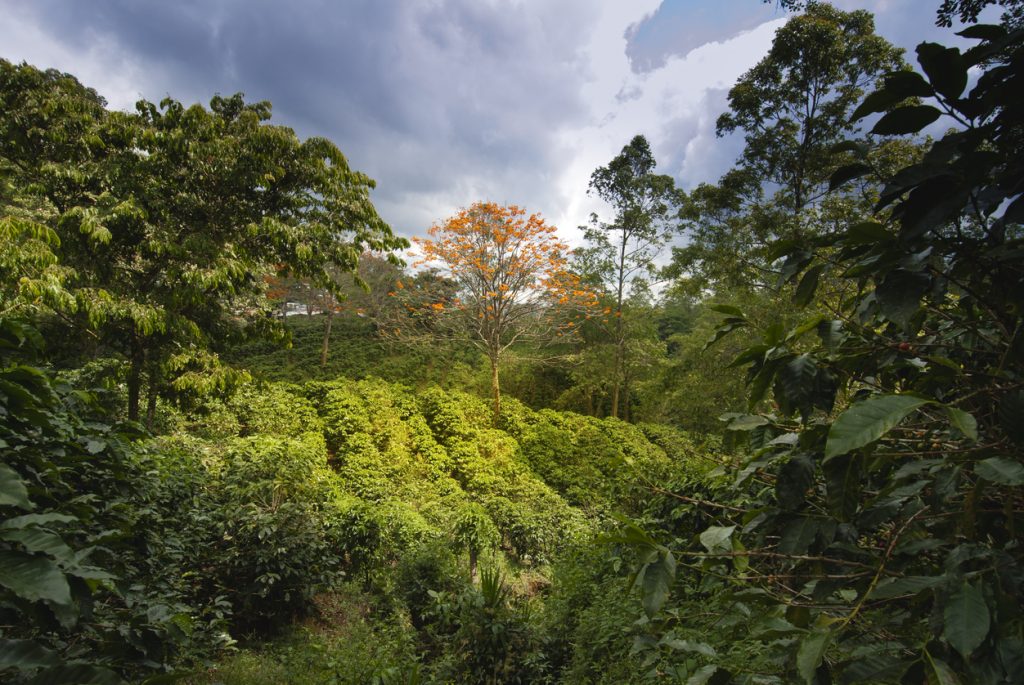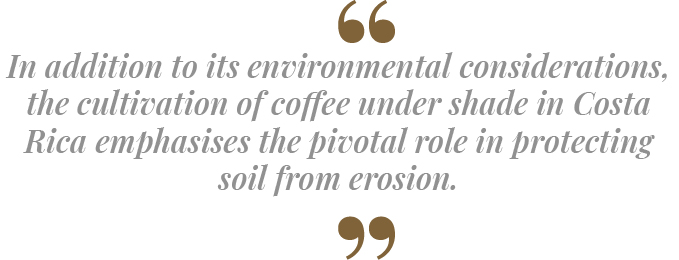Costa Rica’s Groundbreaking Coffee Sustainability: Nurturing Resilience Amidst the Global Climate Challenge
Jan 2024–

In the face of our planet’s complex climate issues, Costa Rica has emerged as a pioneer, embracing an inventive solution to fortify its renowned coffee industry while addressing the intricate challenges posed by a changing climate. At the heart of this eco-conscious practice is the cultivation of coffee under shade, a method that not only ensures the robustness of coffee plants and yields but also represents a holistic strategy to address various climate-related concerns.

Central to the success of this environmentally mindful practice is its significant influence on soil temperature. The protective canopy formed by shade trees proves to be a transformative element by effectively moderating soil temperature, creating an ideal environment for the flourishing growth of coffee plants. Beyond temperature moderation, this method substantially contributes to the conservation of soil moisture—a pivotal factor in maintaining resilient coffee crops, especially in light of unpredictable weather patterns.
A standout feature of shaded coffee plantations is their role as stewards of biodiversity. The diverse ecosystem fostered by the presence of shade trees establishes a habitat that supports a myriad of plant and animal species. This harmonious relationship not only enriches the immediate surroundings but also underscores Costa Rica’s commitment to responsible and sustainable agricultural practices.

As we explore the global tapestry of coffee, it’s essential to recognise the diverse cultivation methods employed around the world. From the rich, bold flavours of Ethiopian coffee grown at high altitudes to the complex and vibrant profiles of Colombian beans, each region contributes to the global coffee experience in its unique way. However, amidst this diversity, Costa Rica’s commitment to sustainability through shaded cultivation sets a commendable standard for the industry.
The positive impact of cultivating coffee under shade extends beyond the coffee plants themselves. These plantations actively engage in water conservation efforts by assisting in the retention of rainwater. By efficiently capturing and utilising rainwater, shaded coffee plantations play a crucial role in supporting local water resources, ensuring resilience in the face of a changing climate, and promoting sustainable agricultural practices that benefit both crops and communities.

Furthermore, shaded coffee plantations serve as valuable carbon sinks, sequestering carbon dioxide from the atmosphere. This dual-purpose strategy not only significantly contributes to mitigating the effects of climate change but also aligns seamlessly with global initiatives aimed at reducing carbon emissions. The additional production of oxygen, a natural byproduct of flourishing vegetation, further amplifies the environmental benefits of this forward-thinking cultivation method.
In addition to its environmental considerations, the cultivation of coffee under shade in Costa Rica emphasises the pivotal role in protecting soil from erosion. The intricate root systems of shade trees serve as a natural defence mechanism against soil degradation, enhancing the long-term sustainability of the land for agricultural purposes.

In conclusion, Costa Rica’s steadfast commitment to sustainable coffee production through shaded cultivation transcends the boundaries of conventional agriculture. It stands as an inspiring example, showcasing a holistic approach that considers environmental conservation, biodiversity preservation, and climate change mitigation. As other coffee-producing regions grapple with similar challenges, Costa Rica’s model serves as a testament to the transformative power of innovative agricultural practices in the ongoing battle against the impacts of climate change.




